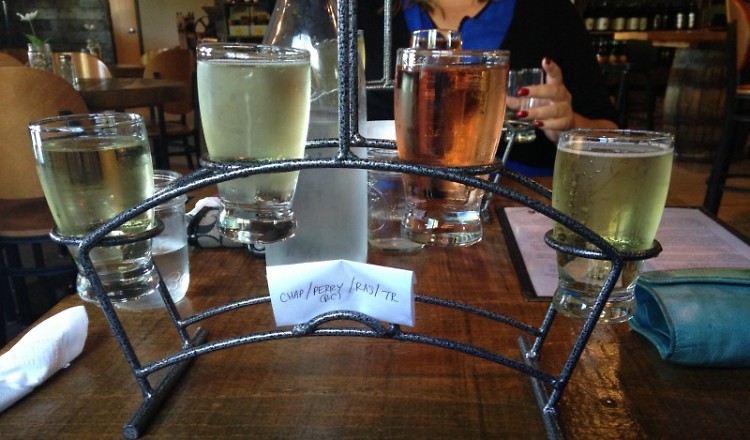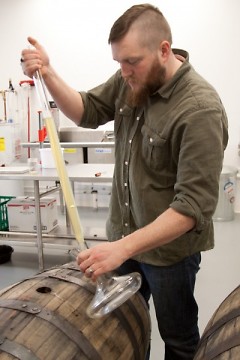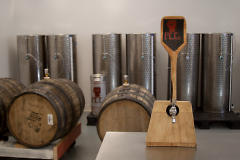Cider is not just a seasonal fall drink, it is growing industry in Michigan. The Peoples Cider Company, Sietsema Orchards, Vander Mill Ciders and Virtue Cider are all local companies crafting hard ciders made from Michigan apples.
“We’re taking this somewhere between craft beer and fine wine,” says Jason Lummen, owner of The Peoples Cider Company. Making cider is Lummen’s obsession.
Lummen saw the opportunity to make his own hard cider after being disappointed with what was out on the market. He says that many of the commercial hard ciders are too sweet and packed with preservatives and extra unnecessary ingredients.
When Lummen started making cider 10 years ago, there was not much of an industry for it. He says the main options for cider then were mostly commercial companies that produced cheap cider that as a result tasted that way. There are still many large companies that make cheap cider, he says, but lately he has noticed the industry is starting to shift.
“We’re seeing an explosion in the cider market in general. We’re really starting to see a trend in cider as craft. That’s where it’s heading,” says Lummen.
The Peoples Cider Company offers dry draft ciders and New England style ciders. They get everything they need to make cider within a 13 mile radius of downtown Grand Rapids.
“Michigan is a great place for craft cider to come about. We grow tons of apples and we have great family farming behind our apple industry,” says Lummen. “Michigan is at a great place to be an industry leader in craft cider because we’re one of the leaders in apple production.”
In Ada, Andy Sietsema is a fourth generation apple farmer of Sietsema Orchards. Sietsema Orchards grows 150 different varieties of apples, many of which are used for making hard and sweet cider.
“I believe that true traditional cider should be dry and not overpowered with sugar and sweetness,” says Sietsema.
Sietsema Orchards offers five different kinds of hard cider. Among the five varieties, they have a green label cider that is made with four different kinds of hops through the process of aging and dry hopping. Sietsema’s also has a white label Lemon Grass cider similar to a Summer Shandy.
“I’ve noticed that the American consumer is getting more educated on what traditional cider ‘should be.’ They are slowly realizing that cider is not supposed to be overpowered with sugar and it’s not supposed to be made from concentrate,” says Sietsema. “Over the past year I’ve noticed significantly that their palates are starting to move to the drier styles of cider.”
Sietsema’s hard cider is distributed state-wide. At the orchard, they offer farm to table dinners that they pair their ciders with.
Another local Michigan cider company is Vander Mill Ciders in Spring Lake. They produce a variety of ciders, from very dry and wine-like to semi sweet with other fruits and nuanced ingredients.
Paul Vander Heide of Vander Mill Ciders has noticed a change in the cider industry over the years.
“There are many more producers in the industry now that are helping to fuel a dramatic increase in awareness to ciders,” Vander Heide says. “Producers are benefiting from the consumers’ willingness to try new things.”
Vander Mill Ciders presses, ferments and packages its ciders all in house. They have a full service restaurant and tasting room with 12 cider varieties on tap.
Currently, Vander Mill Ciders is working with local orchardist Dietrich’s, to plant French, English and American heritage varieties of apples. Further cultivation of these apple varieties will change the different styles of ciders that Vander Mill can create.
Michigan-based craft cider company Virtue Cider sells hard cider in bottles and on tap all throughout West Michigan. The cider makers of Virtue Cider live and work on Virtue Farms year round to press, ferment and age their ciders.
Gregory Hall, founder of Virtue Cider, says they focus on style over flavor, using fresh apples as ingredients for a diverse selection of blends.
“We see a lot of similarities to the craft beer movement of the last 30 years,” says Hall. “Before the explosion of craft, you had few choices at the bar — maybe a lager, a light beer and an import. Today, we see bars like HopCat, with 100 varieties of beer on tap, and smaller bars with three lines just for IPAs. Cider is starting to take a similar path.”
Virtue Cider focuses on traditional European-style farmhouse ciders. They support Michigan apple growers, making their cider from fresh apples and never use apple juice concentrate.
“Americans are realizing that there are distinct regional styles, and that this beverage can offer tremendous complexity and range in flavor profile,” says Hall.
Barrel aging has a large influence on Virtue Cider’s production. With a collection of over 500 barrels at their ciderhouse, Virtue Cider has one of the largest barrel aging programs in North American cider.
“Consumers are more educated about the ingredients they consume, and ciders like ours offer great sophistication with a single, simple ingredient: fresh apples,” Hall says. “We think that there’s plenty of room at the bar for the range of ciders available, and customers are starting to ask for them.”
The Rapidian, a program of the 501(c)3 nonprofit Community Media Center, relies on the community’s support to help cover the cost of training reporters and publishing content.
We need your help.
If each of our readers and content creators who values this community platform help support its creation and maintenance, The Rapidian can continue to educate and facilitate a conversation around issues for years to come.
Please support The Rapidian and make a contribution today.


